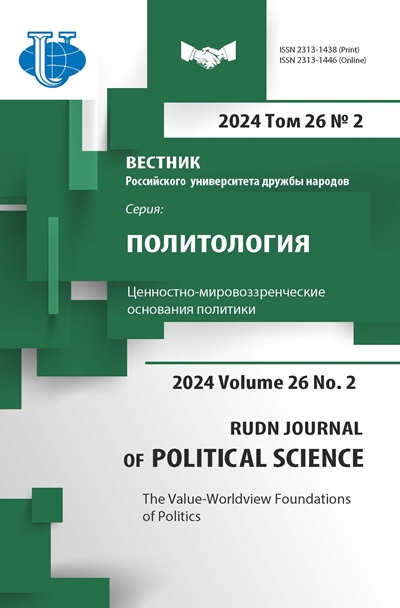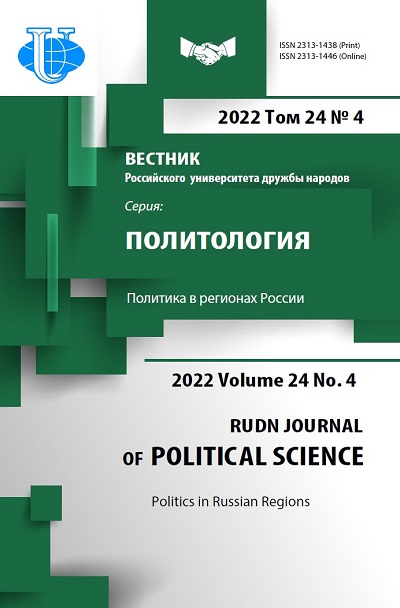The Influence of the Council of Legislators on the Legislative Activity of Regional Parliaments
- Authors: Pomiguev I.A.1,2,3, Zaripov N.A.1
-
Affiliations:
- HSE University
- Institute of Scientific Information for Social Sciences of the RAS
- Financial University under the Government of the Russian Federation
- Issue: Vol 24, No 4 (2022): Politics in Russian Regions
- Pages: 619-633
- Section: REGIONS IN RUSSIAN POLITICS
- URL: https://journals.rudn.ru/political-science/article/view/32818
- DOI: https://doi.org/10.22363/2313-1438-2022-24-4-619-633
Cite item
Full Text
Abstract
The authors focus on the political implication of the emergence and functioning of the Council of Legislators under the Federal Assembly of the Russian Federation. Based on several characteristics of the legislative process, such as the speed of adopting bills, the traffic of initiatives and the share of those adopted, as well as the transcripts of the Plenary Sessions of the Council, the authors conduct a comprehensive analysis of the work of this institution, recording and interpreting several changes. Using the theory of Rational Choice Institutionalism (the Veto Player Theory, in particular), the authors show that the platform established in 2012, originally designed for communication between federal and regional parliaments, has over time become a barrier, predetermining the fate of some initiatives. In addition, the institutional environment created by the Council’s actions has changed the very format of regional activity, whereby the original idea of open dialogue has been replaced by expert discussion within the profile commissions, and the outcome of these activities has shifted from legislative initiatives to expert commentaries and recommendations. Another dimension of influence can be traced in the implementation of the bureaucratic logic associated with redirecting and filtering the traffic of regional initiatives through an extra-constitutional structure. Research results allow the authors to take a different view on the legislative activity of the regions at the federal level, as well as draw attention to the political nature of the work of auxiliary institutions and the «rules of the game» they form in the context of the interactions between the Federal Assembly and the regional parliaments.
About the authors
Ilya A. Pomiguev
HSE University; Institute of Scientific Information for Social Sciences of the RAS; Financial University under the Government of the Russian Federation
Author for correspondence.
Email: pomilya@mail.ru
ORCID iD: 0000-0003-3068-5664
кандидат политических наук, доцент департамента политики и управления факультета социальных наук Национального исследовательского университета «Высшая школа экономики» (НИУ ВШЭ); научный сотрудник отдела политической науки ИНИОН РАН; доцент департамента политологии факультета социальных наук и массовых коммуникаций Финансового университета при Правительстве РФ
Moscow, Russian FederationNikita A. Zaripov
HSE University
Email: nazaripov@edu.hse.ru
ORCID iD: 0000-0003-4834-4665
магистрант факультета социальных наук
Moscow, Russian FederationReferences
- Зарипов Н.А., Помигуев И.А. Скорость принятия законопроектов как индикатор политической природы законотворческого процесса на примере Совета Законодателей // Власть. 2022. Т. 30. № 4. - В печати
- Миронов С.М. Чем занят Совет законодателей // Сводный реферативный сборник журнала Представительная власть - XXI век: законодательство, комментарии, проблемы. 2004. № 2. С. 9-11
- Петров Н.В. Политическая механика российской власти: субституты против институтов // Вестник общественного мнения. Данные. Анализ. Дискуссии. 2009. № 4. С. 5-23
- Помигуев И.А., Алексеев Д.В. Обнуление законопроектов: дисконтинуитет как технология блокирования политических решений // Полис. Политические исследования. 2021. № 4. С. 176-191. https://doi.org/10.17976/jpps/2021.04.13
- Помигуев И.А. Руководство Государственной Думы: возвращение к советскому прошлому? // Политическая наука. 2017. № 3. С. 105-120
- Помигуев И.А. Совет Государственной Думы: реальный вето-игрок или технический исполнитель? // Полис. Политические исследования. 2016. № 2. С. 171-183. https://doi.org/10.17976/jpps/2016.02.12
- Организация законодательного процесса в зарубежных странах / Р.Г. Газизова, Н.М. Касаткина, Н.Б. Крысенкова, Ф.А. Лещенков, А.Н. Пилипенко, Н.Ю. Трещетенкова, Т.И. Чурсина М.: Издание Государственной Думы, 2014
- Тулаев Н.П. Совершенствование законодательного процесса в законодательном (представительном) органе государственной власти: регламентное или законодательное регулирование // Аналитический сборник «Обеспечение парламентской деятельности законодательных (представительных) органов власти Российской Федерации». Издание Совета Федерации. 2008. С. 7-9
- Chaisty P. Presidential dynamics and legislative velocity in Russia, 1994-2007 // East European Politics. 2014. Vol. 30, no. 4. P. 588-601. https://doi.org/10.1080/21599165.2014.96439
- North D.C. Institutions // Journal of economic perspectives. 1991. Vol. 5, no. 1. P. 97-112
- Remington T.F. The evolution of executive-legislative relations in Russia since 1993 // Slavic Review. 2008. Vol. 59, no. 3. P. 499-520. https://doi.org/10.2307/2697343
- Tsebelis G. Veto players and institutional analysis // Governance. 2000. Vol. 13, no. 4. P. 441-474. https://doi.org/10.1111/0952-1895.00141
















